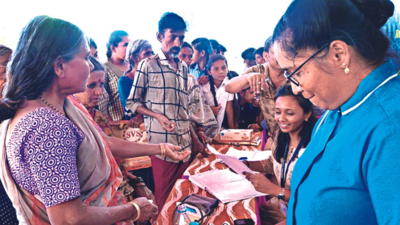Top Searches
- News
- City News
- mysuru News
- Karnataka: Forest department steps up outreach activities in fringe villages
Karnataka: Forest department steps up outreach activities in fringe villages

Forest department, as part of its outreach programme, is holding health camps in the forest fringe villages of the BRT Tiger Reserve in Chamarajanagar district.
MYSURU: Forest department, as part of its outreach programme, is holding health camps in the forest fringe villages of the BRT Tiger Reserve in Chamarajanagar district.
The initiative aims to enlist the support of the localities in the department’s task of safeguarding tigers and other wild animals, by winning their confidence. It is also crucial to tackle incidents of forest fire during the summer season, officials said.
With the health camps, the officials aim to educate the villagers on personal sanitation, ascertain general health conditions, identify common illnesses and provide treatment based on clinical evaluation.
Recently, the department organised a free health check-up camp at Kolipalya village in association with the Rotary Group and Asha Kiran Hospital, Mysuru. Over 250 patients, including men, women and children were examined by doctors at the camp. The department conducted similar health check-ups in other villages as well.
BRT Tiger Reserve, which shares its borders with Male Madeshwara Wildlife Sanctuary and Sathyamangalam Tiger Reserve, is spread across an area of 565 sq km. It was declared a wildlife sanctuary in 1987 and a tiger reserve in 2011. BRT houses tigers, leopards, wild dogs and other carnivorous and herbivorous wild animals. Nearly 274 bird species have been recorded during a recent bird census survey. The tiger reserve, connected to the Western Ghats, is rich in biodiversity, according to experts.
As many as 165 villages come under the eco sensitive zone of the BRT Tiger Reserve that is divided into five zones. Of the 165 villages, 40 of them are tribal settlements which are located deep inside the forests. “As localities play a crucial role in tackling wildfire, the forest department organised a series of outreach programmes throughout the year in densely populated villages in the eco-sensitive zones,” Karnataka State Wildlife Board member G Malleshappa told TOI.
“We also aim to spread awareness among people on conservation of forests. The department also distributed textbooks and teaching materials to school students, held a self-employment training programme for local youths, women, sports and other cultural activities in association with non-government organisations,” he said.
“The health camps organised by the forest department have helped a lot of people in the forest fringe villages as otherwise they have to trek on a kutcha road to reach the nearest hospital for treatment, even in the case of emergency,” he added.
Speaking to TOI, BRT Tiger Reserve director Deep J Contractor said the forest department will organise health camps and outreach activities to reduce the negative interactions between the villages and forest department. “Such measures are needed to win the trust of the villagers and get them to cooperate for conservation of forests,” she said.
The initiative aims to enlist the support of the localities in the department’s task of safeguarding tigers and other wild animals, by winning their confidence. It is also crucial to tackle incidents of forest fire during the summer season, officials said.
With the health camps, the officials aim to educate the villagers on personal sanitation, ascertain general health conditions, identify common illnesses and provide treatment based on clinical evaluation.
Recently, the department organised a free health check-up camp at Kolipalya village in association with the Rotary Group and Asha Kiran Hospital, Mysuru. Over 250 patients, including men, women and children were examined by doctors at the camp. The department conducted similar health check-ups in other villages as well.
BRT Tiger Reserve, which shares its borders with Male Madeshwara Wildlife Sanctuary and Sathyamangalam Tiger Reserve, is spread across an area of 565 sq km. It was declared a wildlife sanctuary in 1987 and a tiger reserve in 2011. BRT houses tigers, leopards, wild dogs and other carnivorous and herbivorous wild animals. Nearly 274 bird species have been recorded during a recent bird census survey. The tiger reserve, connected to the Western Ghats, is rich in biodiversity, according to experts.
As many as 165 villages come under the eco sensitive zone of the BRT Tiger Reserve that is divided into five zones. Of the 165 villages, 40 of them are tribal settlements which are located deep inside the forests. “As localities play a crucial role in tackling wildfire, the forest department organised a series of outreach programmes throughout the year in densely populated villages in the eco-sensitive zones,” Karnataka State Wildlife Board member G Malleshappa told TOI.
“We also aim to spread awareness among people on conservation of forests. The department also distributed textbooks and teaching materials to school students, held a self-employment training programme for local youths, women, sports and other cultural activities in association with non-government organisations,” he said.
“The health camps organised by the forest department have helped a lot of people in the forest fringe villages as otherwise they have to trek on a kutcha road to reach the nearest hospital for treatment, even in the case of emergency,” he added.
Speaking to TOI, BRT Tiger Reserve director Deep J Contractor said the forest department will organise health camps and outreach activities to reduce the negative interactions between the villages and forest department. “Such measures are needed to win the trust of the villagers and get them to cooperate for conservation of forests,” she said.
Start a Conversation
FOLLOW US ON SOCIAL MEDIA
FacebookTwitterInstagramKOO APPYOUTUBE









